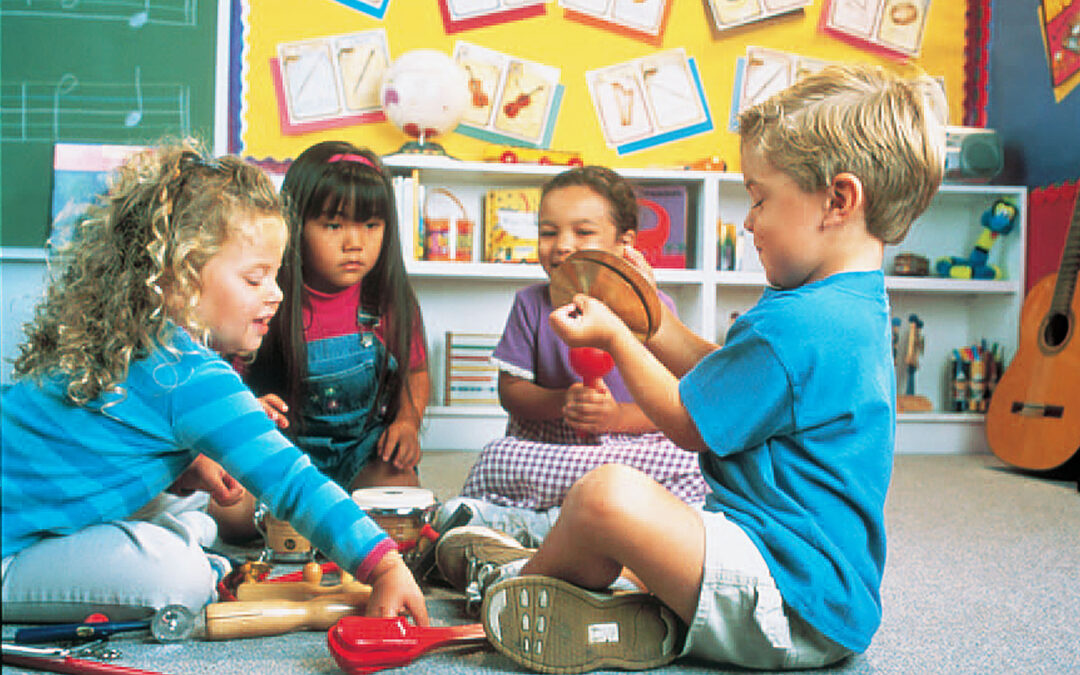In the early stages of life, children are like sponges, absorbing information from their surroundings at an astonishing rate. One of the most effective tools for aiding their development, particularly in language acquisition, is music. Music has a unique way of engaging children, and research shows that it can significantly influence their language skills, helping them learn new words, understand rhythm, and develop listening skills. In this blog, we’ll explore the relationship between music and language development in young children and why incorporating music into early childhood education is so beneficial.
Understanding the Connection Between Music and Language
At first glance, music and language may seem like two distinct forms of communication. However, they share many similarities. Both rely on patterns, rhythm, and tonal variations to convey meaning. When children are exposed to music, they begin to recognize these patterns and rhythms, which are fundamental components of language.
- Music and Vocabulary Development
Songs, especially those designed for children, often include repetitive phrases and rhymes. This repetition helps reinforce new words, making it easier for young children to remember and use them. For example, nursery rhymes like “Twinkle, Twinkle, Little Star” use simple vocabulary and repetition, which can help children learn new words more effectively than in normal speech.
Furthermore, songs introduce children to a broader vocabulary than they might encounter in everyday conversation. Through music, children are exposed to descriptive language, storytelling, and a variety of sentence structures, all of which contribute to expanding their vocabulary.
- Enhancing Phonological Awareness Through Music
Phonological awareness is the ability to recognize and work with sounds in spoken language. Research has shown that children who engage in musical activities are more likely to develop strong phonological awareness. When children sing songs, they’re not only learning words but also practicing how to break them down into individual sounds. This practice is crucial when they start learning to read.
Rhymes and songs help children notice how sounds are similar or different. For instance, when singing a song that includes words like “cat,” “bat,” and “hat,” children learn to recognize that these words rhyme because they end with the same sound. This ability to identify and manipulate sounds is a key skill in learning to read and write.
- Music Fosters Listening Skills
In today’s fast-paced world, developing good listening skills is more important than ever. Listening to music can help children learn to focus and pay attention to details. Songs with varying tempos and dynamics require children to listen closely to notice changes, which can translate into better listening skills in language as well.
For example, when a child listens to a lullaby, they may pay attention to the soft, slow rhythm, which can be calming and soothing. In contrast, an upbeat song may require them to follow a faster rhythm, sharpening their focus and attention. These skills are not only beneficial for language development but also play a critical role in overall cognitive development.
- Encouraging Social Interaction and Communication
Music often brings children together, creating opportunities for social interaction. Whether it’s singing along to a song or participating in a group music activity, children learn to communicate with their peers. These interactions help children develop social skills like turn-taking, listening to others, and responding appropriately.
For instance, in a classroom setting, when children sing a song together, they learn to wait for their turn and follow instructions. These social skills are essential for effective communication and help build a strong foundation for language development.
Why Incorporating Music into Early Childhood Education Matters
Now that we understand how music supports language development, it’s important to recognize why incorporating music into early childhood education is so crucial. Studies have consistently shown that children exposed to music at a young age tend to have better language skills, are more socially engaged, and show higher levels of emotional intelligence.
- Music as a Fun Learning Tool
Music makes learning enjoyable, and when children have fun, they’re more likely to stay engaged and retain information. Integrating music into daily routines, whether through sing-alongs, musical games, or simply listening to songs, can make language learning feel like play rather than a chore. - Music Supports Emotional Development
Music can also help children express and manage their emotions, which is an essential part of language development. By singing songs that reflect various emotions, children learn to connect words with feelings. This understanding is fundamental for developing emotional intelligence, which supports their ability to communicate effectively. - Building Confidence Through Music
Participating in musical activities can boost a child’s confidence. When children learn the lyrics to a song and sing it out loud, they gain a sense of accomplishment. This confidence in their abilities can encourage them to speak more freely and explore language without fear of making mistakes.
Practical Ways to Incorporate Music into Early Language Learning
If you’re a parent or educator looking to incorporate music into a child’s language development journey, here are a few practical tips to get started:
- Sing Daily: Make singing a part of your daily routine. Singing together during transitions, like getting ready in the morning or during cleanup time, can turn ordinary moments into learning opportunities.
- Use Songs to Teach New Concepts: Create songs that incorporate new vocabulary or concepts. For example, if you’re teaching colors, sing a song that mentions different colors, pointing them out as you sing.
- Encourage Movement with Music: Combine music with movement by encouraging children to dance or play along with simple instruments. This can help reinforce language concepts through a multi-sensory approach.
- Explore Different Genres: Expose children to a variety of musical styles. Different genres often use unique vocabulary and rhythms, which can broaden their language exposure and understanding.
At Rising Stride, we understand the importance of nurturing all aspects of a child’s growth, including language development. Our curriculum is designed to provide children with rich and engaging experiences, including music, to help them reach their full potential

